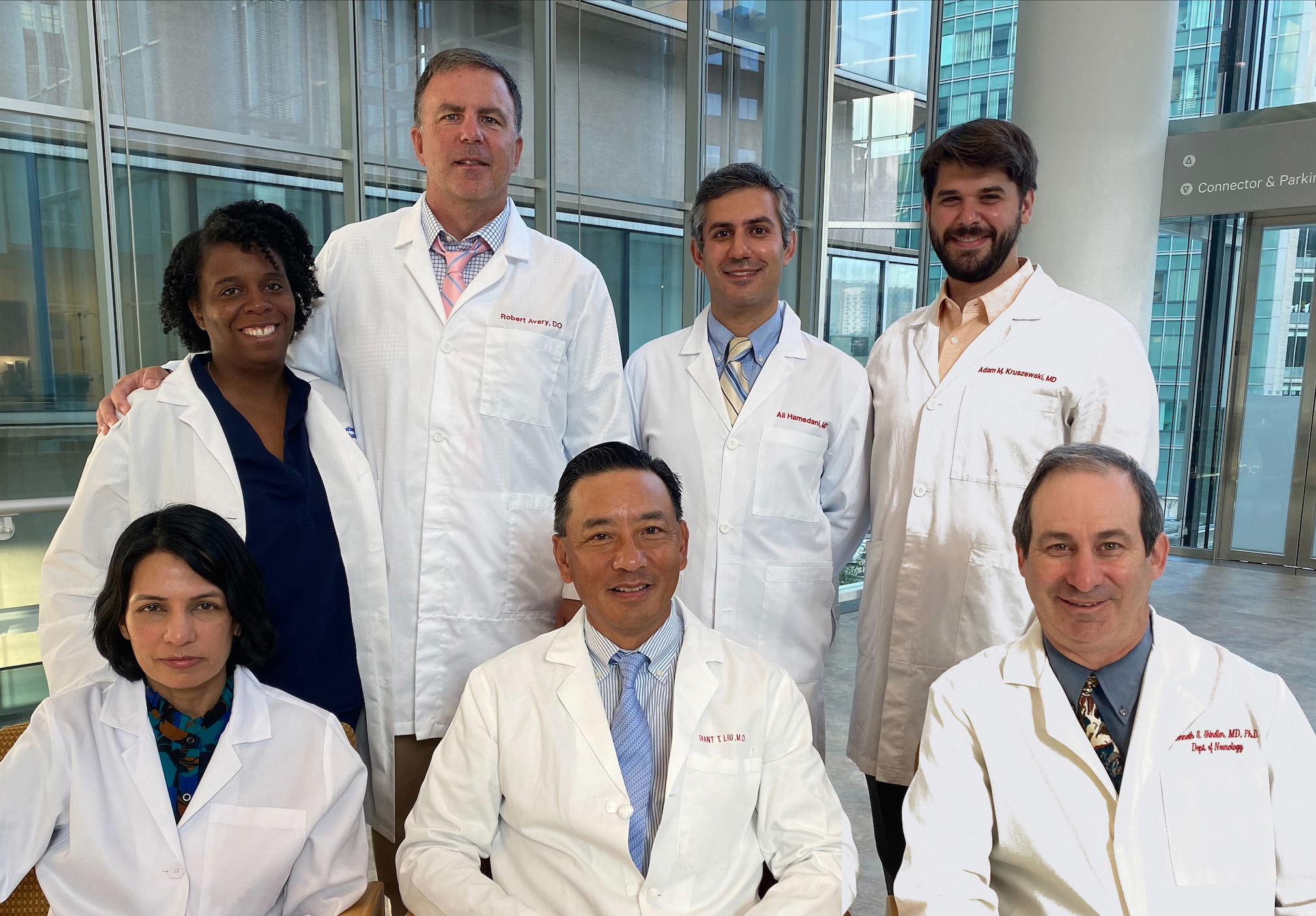
NEURO-OPHTHALMOLOGY FACULTY
AT PENN
 |
|
|
Grant T. Liu, MD
Hospital of the University of
Pennsylvania; 3400 Spruce St., Phila., PA 19104
215-349-8460
Dr. Liu, a Professor of Neurology and Ophthalmology, received his medical degree from Columbia University. He completed a neurology residency at the Harvard-Longwood Neurology Program and a fellowship at the Bascom-Palmer Eye Institute, University of Miami. Although he sees both adult and children with neuro-ophthalmic problems, his special interest is in pediatric neuro-ophthalmology. He was appointed Division Chief in 2012 and the Raymond G. Perelman Endowed Chair in Pediatric Neuro-Ophthalmology at the Children's Hospital of Philadelphia in 2015. His clinical research interests include optic pathway gliomas, pediatric pseudotumor cerebri syndrome, and optic neuritis in children.
Kenneth S. Shindler, MD,
PhD
Scheie Eye Institute; 39th and Market Sts., Phila., PA 19104
215-662-8042
Dr. Shindler, who joined the faculty in July 2004, is an Associate Professor of Ophthalmology and Neurology and holds the F.M. Kirby Endowed Chair in Ophthalmology. He received his medical degree from Washington University (St. Louis, MO) and completed his residency in ophthalmology and fellowship in neuro-ophthalmology at the University of Pennsylvania. Dr. Shindler has a PhD in neuroscience from Washington University. His R01-funded research interests include studying mechanisms of nerve cell damage in optic neuritis and other diseases of the optic nerve. In addition to treating patients at the Scheie Eye Institute, Dr. Shindler directs the Neuro-Ophthalmology service at the Philadelphia VA Medical Center.
Madhura Tamhankar, MD
Scheie Eye Institute; 39th and Market Sts., Phila., PA 19104
215-662-8042
Dr. Tamhankar, an Associate Professor of Ophthalmology and Neurology, completed her residency in ophthalmology and fellowship in neuro-ophthalmology at the University of Pennsylvania. She joined the Penn faculty and Scheie Eye Institute in 2007. In addition to caring for patients with neuro-ophthalmologic disorders, she performs eye muscle surgery on adults to correct ocular misalignment resulting from childhood strabismus, cranial nerve palsies, strokes and intracranial tumors. She is co-director of our Thyroid Eye Disease clinic. Her research interests include exploring different treatment options for strabismic disorders. She is also the Vice Chair of the American Academy of Ophthalmology (AAO) Committee for the North American Neuro-ophthalmology Society (NANOS).
Robert A. Avery, DO, MSCE
Children's Hospital of Philadelphia; 34th St. and Civic Center Blvd, Phila., PA 19104
215-590-4591
Dr. Avery, an Associate Professor of Ophthalmology and Neurology, joined the faculty in 2015. He completed both his pediatric neurology residency and neuro-ophthalmology fellowship at the Children’s Hospital of Philadelphia/University of Pennsylvania. Dr. Avery also received his Master of Science in Clinical Epidemiology from the University of Pennsylvania. His research investigates the utility of optical coherence tomography in optic neuropathies and clinical outcome measures in children with optic pathway gliomas. He is the ophthalmology lead for three Phase 3 clinical trials testing new therapies for children with optic pathway gliomas. His research is supported by the National Cancer Institute, an R01 award from the National Eye Institute, an Investigator Initiated Award from the Department of Defense, and a grant from the Gilbert Family Foundation's Visual Restoration Initiative.
Ahmara G. Ross, MD, PhD
Scheie Eye Institute; 39th and Market Sts., Phila., PA 19104
215-662-8042
Dr. Ross, an Assistant Professor of Ophthalmology and Neurology, completed her ophthalmology residency at the University of Pittsburgh then fellowships in Neuro-ophthalmology and Glaucoma at the Scheie Eye Institute, University of Pennsylvania. She also has a PhD from Thomas Jefferson University. In addition to caring for patients with both glaucoma and neuro-ophthalmologic disorders, she also performs ocular surgery ranging from cataracts to minimally invasive and incisional glaucoma surgery. Dr. Ross joined the faculty in 2017, and her research is funded by an NIH K08 Career Development award and another from The Harold Amos Medical Faculty Development Program of The Robert Wood Johnson Foundation to investigate the neuroprotective potential of gene therapy directed at retinal ganglion and neighboring support cells to treat glaucoma.
Ali G. Hamedani, MD, MHS
Hospital of the University of
Pennsylvania; 3400 Spruce St., Phila., PA 19104
215-349-8460
Dr. Hamedani is an Assistant Professor of Neurology and Ophthalmology who joined the faculty in 2018 after completing his neurology residency and neuro-ophthalmology fellowship at the University of Pennsylvania. He also has additional training in movement disorders and has a particular interest in the intersection of these two fields, including visual symptoms associated with Parkinson disease and other neurodegenerative disorders. He sees neuro-ophthalmology patients at both the Hospital of the University of Pennsylvania and Pennsylvania Hospital and also directs the ataxia and neurogenetics clinic at Pennsylvania Hospital. Dr. Hamedani holds a master's degree in epidemiology from Johns Hopkins, and his research focuses on the study of neuro-ophthalmic biomarkers of neurodegenerative disease and the relationship between vision loss and outcomes in Parkinson's disease and other movement disorders. He was recently awarded a K23 award by the National Eye Institute and is also supported by the Michael J. Fox Foundation.
Adam M. Kruszewski, MD
Hospital of the University of Pennsylvania; 3400 Spruce St., Phila., PA 19104
215-349-8460
Dr. Kruszewski is a Penn Medicine Clinician who joined the faculty in 2022 after completing his neurology residency and neuro-ophthalmology fellowship at the University of Pennsylvania. He sees adult neuro-ophthalmology patients at the Hospital of the University of Pennsylvania and general neurology patients at Pennsylvania Hospital. His clinical and research interests include neuro-ophthalmologic manifestations of neuro-immunologic and autoimmune disorders.